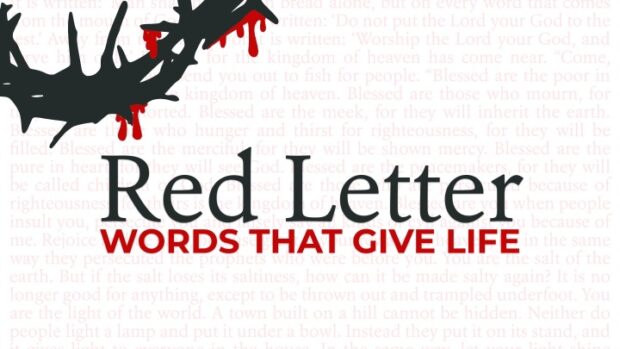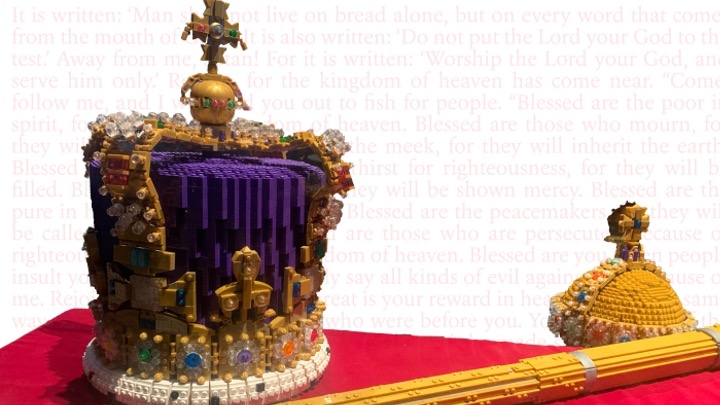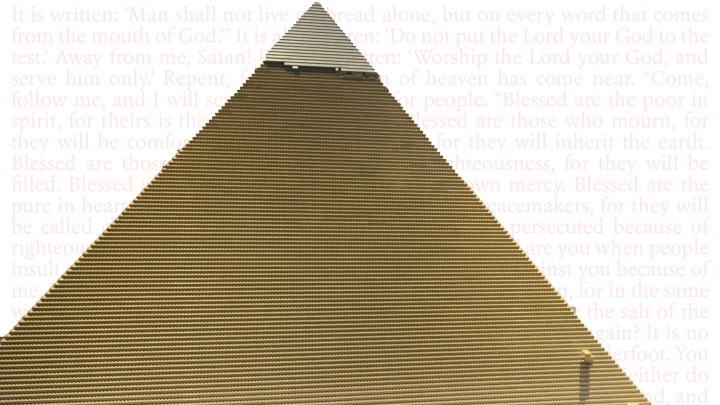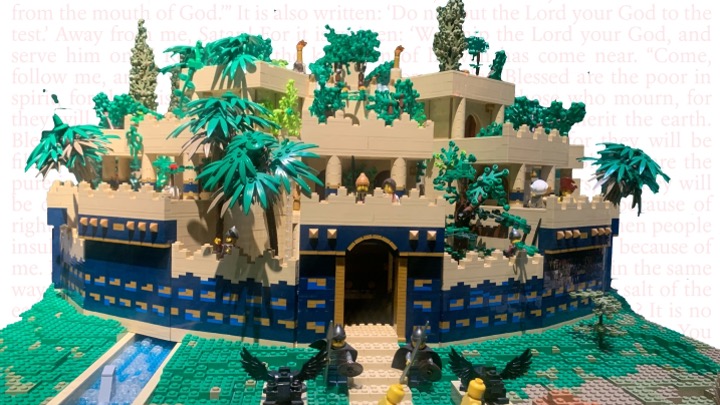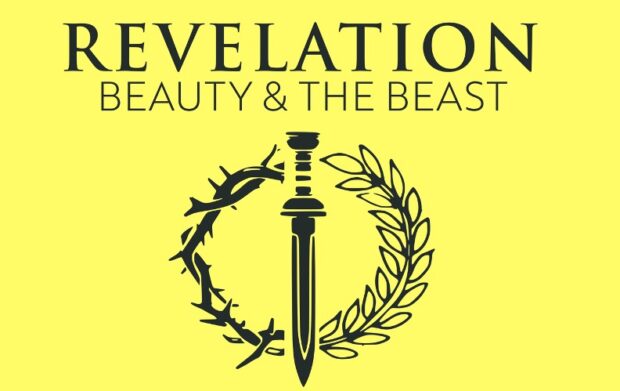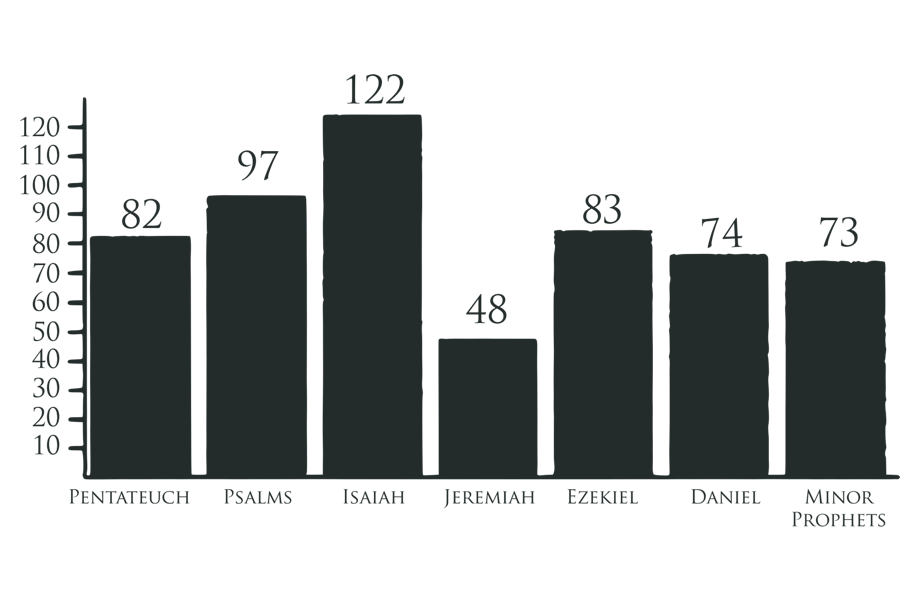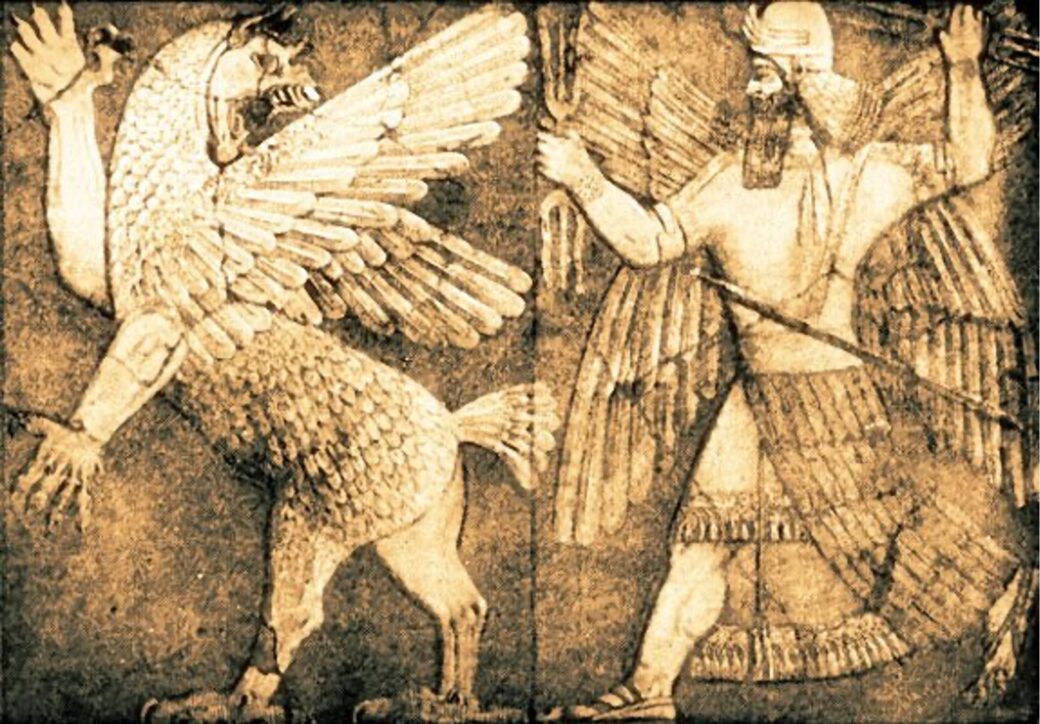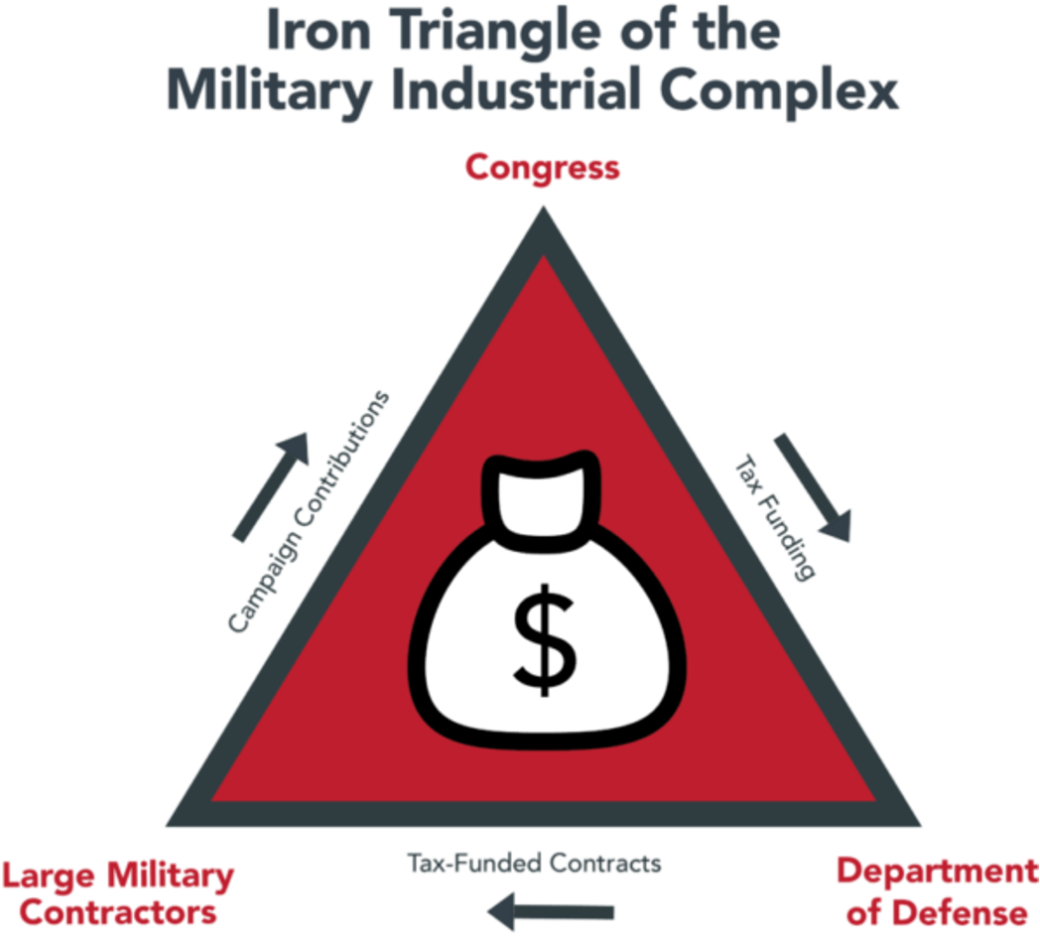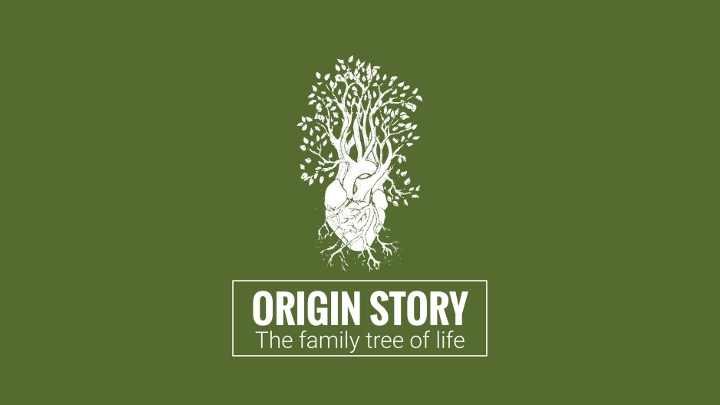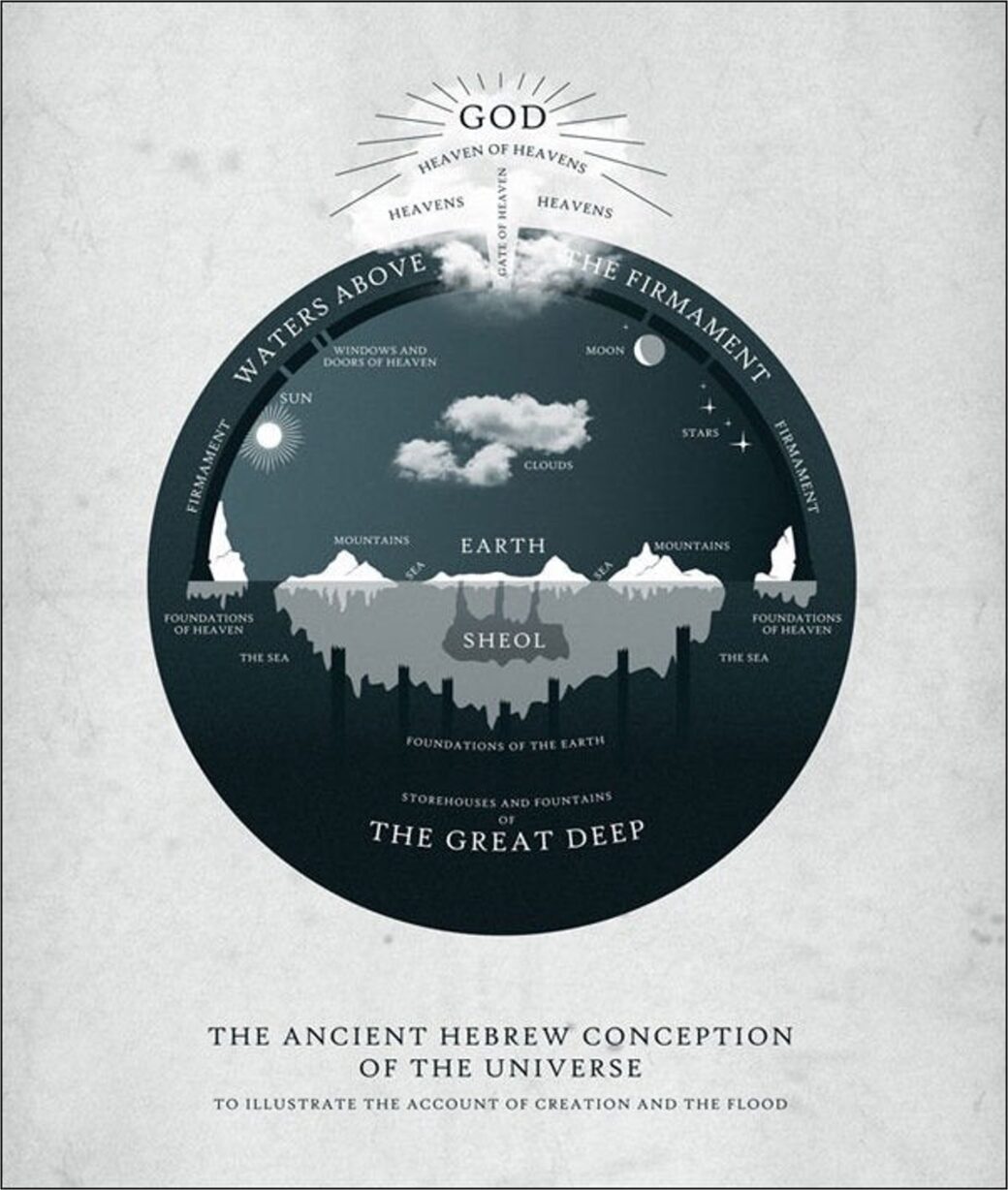A few years ago (2022) I preached a topical sermon series exploring what it means to be human in an age that seems to be built to disintegrate us — I mean that in the sense of fragmenting and pulling us apart as we are moved in many directions away from our embodied reality and away from God. I’ve been meaning to turn these into posts for a while — blogging has taken a back seat for me (obviously).
I preached this series when the most ‘AI’ thing I’d played with was thispersondoesnotexist.com and very early Midjourney image generation. Over the next little while I’m going to turn the sermons into posts here. This was talk one — you can listen to it as a podcast here, or watch it on video. It’s not unhelpful to think of this series as a ‘book’ preached chapter by chapter.
And, a note — there are lots of pull quotes from various sources in these posts that were presented as slides in the sermons, but not read out above.
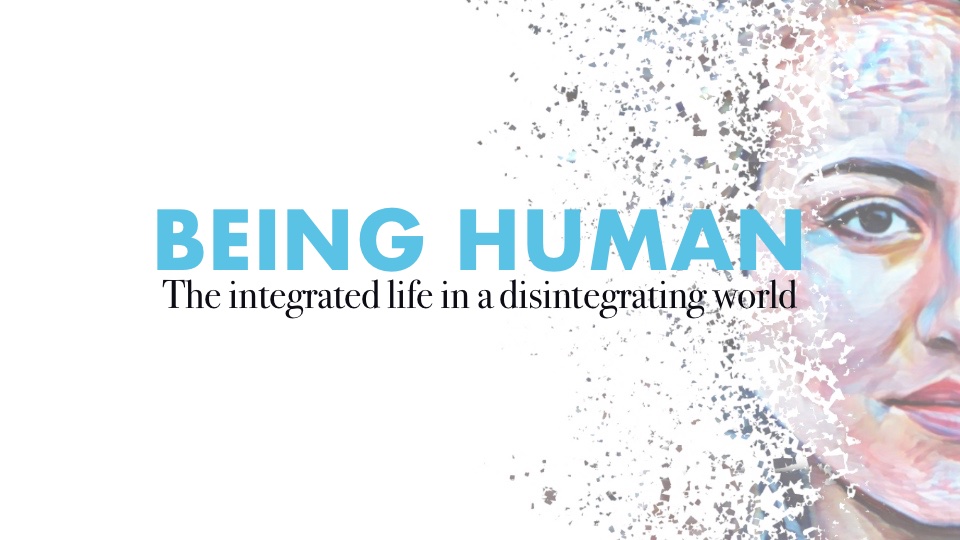
This is a different sort of sermon to normal — and a different series. I just want to warn you up front, because I am wanting to set the scene a little for us as we tackle this series. There will be a little more talking about the world, and a little less working through a passage like we did through Matthew, and then through Genesis.
We are just coming off the back of our Origin Story series where we saw how God is the author of a story — a complex and integrated story that runs through the whole Bible; and how we were made to live lives shaped by this story. But it is a story we have lost in the modern Western world; and this loss is coupled with the loss of God, as the author of life — not just life in general, but our lives.
We are living in a world more like Babylon; where our neighbours are trying to make a name, and a story, for ourselves. We are the authority over our own lives, the authors of our own stories. But there are some movers and shakers in modern Babylon who are starting to realise we have lost a grand narrative — and that maybe Babylon needs one to survive.
So the World Economic Forum is inviting us to discover The Great Narrative for a Better Future.
Now, I do not think the U.N, or the E.U, or the World Economic Forum are the only “towers of Babel” around. Any of us can try to build things where we are little gods in little kingdoms — and you are probably more likely to be impacted by an Instagram influencer, or your family and friends, than by a bunch of faceless boffins in global think tanks.
But there is something about an organisation trying to unite the world to alter the future, creating a sort of trans-national heaven on earth, without God, that is Babylon-esque.
This book is a product of political and thought leaders from around the world — looking for a new story, especially as we have been so shaken by the pandemic.
“Narratives are how we make sense of life; they provide us with a context, thanks to which we can better interpret, understand and respond to the facts we observe.”
— The Great Narrative, Klaus Schwab, Thierry Malleret
They recognise that stories are powerful — they provide us with meaning-making and a context we use to make sense of the world. They recognise that the loss of a coherent and integrating narrative has created many of our problems.
And just like Rome and Babylon and Egypt there is wisdom in the thoughts of these leaders — and there is idolatrous guff — and it is our job to figure out what is gold that is worth integrating into our own thinking, or, rather, where they are thinking true things about God’s world.
“Complex systems are often characterised by an absence of visible causal links between their elements, which makes them impossible to predict.”
— The Great Narrative, Klaus Schwab, Thierry Malleret
Their analysis of life in the modern world is that life now is complex — everything now seems multi-factorial, and all the systems out there are integrated. You change one thing in one place, and this integrated complexity flows through to all sorts of unexpected places.
We are seeing this with the price of lettuce with the floods, and the price of fuel with the Ukraine conflict, and the empty shelves at the supermarket when different global supply chains are disrupted.
Supply chains for complex products — like electronics, or a computer — look like this when you map them. And we live in these systems — like one of these dots in the supply chain for a single Dell laptop — and we are in danger of being pulled apart by this web of forces we do not see.
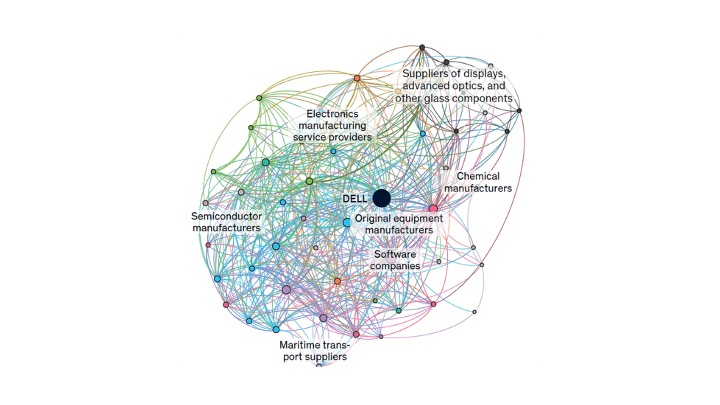
Life is complex.
And, as The Great Narrative puts it:
“Everything is happening much faster than it used to, because technological advances and, to a lesser extent, globalization have created a culture of immediacy… This new culture of immediacy, obsessed with speed, seems to be in all aspects of our lives… It is so pervasive that some thinkers have called this new phenomenon the ‘dictatorship of urgency’.”
— The Great Narrative, Klaus Schwab, Thierry Malleret
Now I think this is a reasonable analysis that lines up with how I am feeling about the world, and about life.
How about you?
This is not a new idea. The French philosopher Jacques Ellul wrote about our technological age — our obsession with using technique and technologies to solve our problems — back in 1954.
He argues that technology does not just change our environment; by doing that it changes us — modifying our essence. We have to adapt to this new world that is of our making; a world where the tools we have made to extend our limitations push us beyond our limits.
Here is a quote:
“Technique has penetrated the deepest recesses of the human being. The machine tends not only to create a new human environment, but also to modify man’s very essence. The milieu in which he lives is no longer his. He must adapt himself, as though the world were new, to a universe for which he was not created.”
Jacques Ellul, The Technological Society
That is one of the key ideas in this series — that our limits, as humans, are actually a good gift to us from an unlimited God, and maybe we should embrace them more.
Ellul says we are made to walk — our bodies — at 6 kilometres an hour, but now machines fly us around at a thousand. We are made to live in a rhythm with the natural world, but we obey a clock. We use electric lights, and screens, to stay up late and sleep less.
And here is the kicker — we were created, he says, with a sort of essential unity — an integrity or coherence — but all these forces of the modern world are fragmenting us. They are disintegrating us. And that is what many of us are feeling, seventy years later.
Disintegrated.
Technology always extends us beyond our natural limits; sometimes in good ways, but always in ways that change us — it lets us push against the limits of being bodies who live in space, and time. Our technology can move us faster around space, or throw our images or voices to the other side of the world in an instant.
Making technology is part of being made in the image of a maker — but our technology — like Nimrod and Nebuchadnezzar’s bricks — can make us feel like gods.
The writer Yuval Noah Harari is one of the thought leaders the World Economic Forum loves.
He has a slogan: “History began when humans invented gods, and will end when humans become gods.”
He is the first person to present a TED talk as a hologram — or digital avatar — a picture of time and space being warped by technology.
He believes we are moving into a new phase of existence — a move he writes about in his best-seller Homo Deus — Latin for “divine human” — where he says now technology has lifted us from beastliness, the next stage is going to be chasing immortality, and bending the world to our will — upgrading us humans into gods. We will become the authors of our own destiny; our own lives.
“…having raised humanity above the beastly level of survival struggles, we will now aim to upgrade humans into gods, and turn Homo sapiens into Homo deus.”
— Yuval Noah Harari, Homo Deus: A Brief History of Tomorrow
He is not alone.
Jeremy Rifkin is an economic advisor to the European Union. Back in the 1980s he wrote about life beyond God:
“We no longer feel ourselves to be guests in someone else’s home and therefore obliged to make our behaviour conform with a set of pre-existing cosmic rules.
It is our creation now. We make the rules. We establish the parameters of reality. We create the world, and because we do, we no longer feel beholden to outside forces.
We no longer have to justify our behaviour, for we are now the architects of the universe. We are responsible to nothing outside ourselves, for we are the kingdom, the power, and the glory for ever and ever.”
Recognise those words?
Part of what has caused the loss of a grand narrative, in the West, is this decision to position ourselves as God and to push and push God out of the picture. It is Babel, only now we are not building a tower into the heavens; we are saying the heavens do not exist.
Our model of reality used to be a cosmos, where the heavens and the earth exist and God is present in both. That shifted to a belief that there was a secular realm, where God had no interest, and a sacred realm — where we get ideas like the separation of church and state, or secular work and God’s work. To now where there is only the secular; the universe; us and our technology in a material world.
The philosopher Charles Taylor wrote a book called A Secular Age — he calls this process “disenchantment.” That is a word that is going to come up a bit in this series.
He says:
“Disenchantment dissolved the cosmos, whose levels reflected higher and lower kinds of being… which contained spirits and meaningful causal forces… In its stead was a universe ruled by causal laws.”
Lots of people have stories for how we ended up here — disenchanted, and with this secular frame as the default. He calls these subtraction stories — the idea that we have shed bad stuff and elevated ourselves by removing superstitions that held us back. The “science killed God” story. But he believes the process is more complex than just enlightenment.
“What I call subtraction stories… I mean by this stories of modernity in general, and secularity in particular, which explain them by human beings having lost, or sloughed off, or liberated themselves from certain earlier, confining horizons, or illusions, or limitations of knowledge.”
And it is also that we have added new things and ideas and practices that have made this move possible; through new technology; migration and the opening up of multiple religious stories. We are not just subtracted, but pulled in lots of directions, and this stops us having one big shared story.
Taylor again:
“Western modernity, including its secularity, is the fruit of new inventions, newly constructed self-understandings, and related practices.”
This is part of what is happening with the decline of Christianity in the Western world — that we have seen mirrored in the Australian census results where in every hundred people there are about this many Christians.
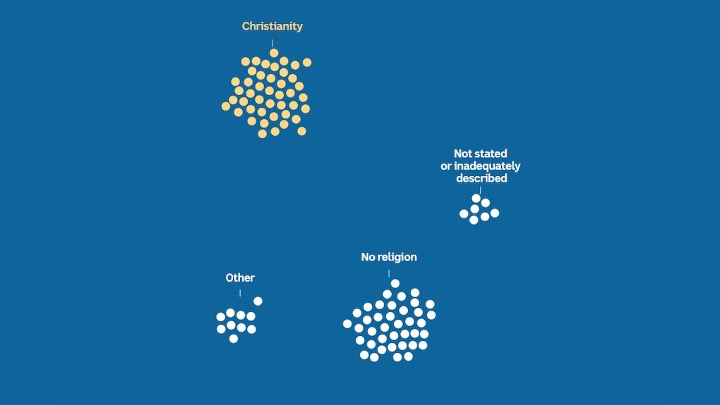
Stan Grant wrote this fascinating analysis for the ABC. He says:
“…the West is not the world. Indeed in many parts of the world the turn to religion is connected with a rejection of colonialism and Western values…
The West is a place beyond history. The past is another country. Tradition is seen as stifling, old fashioned. No doubt some traditions are well rid of. Which woman or person of colour would want to return to the white, male-dominated 1950s?”
This ‘subtraction’ phenomenon is only really happening in the Western world — people are actually becoming more religious in places where Western values are not part of the story, while we in the West are cutting ourselves off from history and tradition. Also, just as a disclaimer — noting Grant’s points — just as adopting some new technology into our lives is good for us as humans, some rejecting of old ideas is good, especially for people who are not white, or male.
Grant points out that while historically the West was built on a shared version of the Christian story; the modern West is shaped by a breakup with God where God is not sovereign, but people are. Where liberalism — individual freedom — our self-authorship — where we are the authority over our lives — is the chief good. And now we are free to re-imagine and re-invent ourselves, untethered from the past, from our family, and from faith — and that sort of liberation has a fundamental goodness to it so long as we are escaping a bad story, and finding ourselves in a better story.
There are people here who have come from other faith traditions, or who have escaped abusive family or church traditions, or who are enjoying the benefits of a Western world where women, and sexual minorities, and non-white people have increasing dignity… and this is good liberation; freedom from bad authorities — bad authors. We want to be able to see the goodness in liberation, while questioning the narratives we are moving to; the stories on offer in the world — whether that is the Great Narrative, or the promise offered by technology companies, or our entertainment, or advertisers, or Instagram influencers, or the stories we make for ourselves. We have to ask if authoring our own stories — being our own authorities; belonging to ourselves — is actually liberating.
Are the modern West’s God-free stories — whether we become gods, or choose God’s role in our lives as a personal choice — better than what we have rejected? We will look more at this next week in terms of what the idea that “we belong to ourselves” does. This week we are going to tackle a different starting point: asking what the God our world has liberated itself from is actually like.
See, here is the other thing that is true about the West — and you will see this in “how did we get here” stories — from Stan Grant, or Charles Taylor, or the secular historian Tom Holland who wrote a book about exactly this. Because the West was first shaped by belief in the Christian God, before rejection of the Christian God, developments in how we understand God, the world, and humanity in the West are often what you might call Christian heresies. Secularism itself is made possible by Christianity in a way it is not by Islam.
Heresies are often a failure to hold two — sometimes more — paradoxical ideas in tension.
The writer G.K. Chesterton wrote a book in the early 20th century called Orthodoxy. He is a fun writer, and he talks about this inability for us to hold tensions.
He says the way to avoid heresy in these situations where there are furious opposites is not to pick one, or to find some middle ground, but to hold both truths, and to hold them furiously:
“Christianity got over the difficulty of combining furious opposites, by keeping them both, and keeping them both furious.” — G.K. Chesterton, Orthodoxy
Christianity is a belief system built on these tensions — Jesus being fully God and fully man; the Bible being God’s word, but also human; and God being three and one, and also infinite and glorious and so not “in” the universe as a creature, but also knowable through his work in the world — and paradoxically, through the Word becoming flesh, entering the world as the creator in the creation — the author writing himself into the story.
The shift from cosmos to universe — disenchantment — the modern West as we see it and experience it is built on a Christian heresy; it starts with a warped view of God.
Part of the flattening of the cosmos to the universe is a product of us wanting to live and act as though God is a creature; a being we might find through our human observation. When we could not find God with a telescope, or space travel, suddenly “science had disproved God.” But this happened through the removal of the idea that there is a transcendent overlapping spiritual reality; a heavens and an earth.
This emphasis on the natural world meant rejecting the Bible as God’s word — it became human utterances about an unknowable God, pasted together by evolving human processes. People started looking for the historical Jesus behind all the spiritual stuff in the Gospels, and rejecting the idea that Jesus is divine — that he is the Word of God come in the flesh. And in the same theological schools there was a rejection of the idea of the Trinity, because God was either fully beyond our reach, never engaging with the world, or unknowable from the incarnation or the Bible. And this all started first in the church.
We can do another thing in the church where we emphasise the opposites of all these moves — seeing Jesus as fully divine, and not really human, or seeing the Gospel just as spiritual, with no bearing on life in the world, or the Bible as only divine and not a product of human authors embedded in the community of God’s people, and in history. We even saw a thing in the last few years where Christians jumped up to support a footballer who rejected the Trinity — who saw humanity as just a skin God was wearing for a bit — but said some things about sexuality people liked. Many of us saw him as a Christian saying bold things, and the Trinity as too hard and not important. It has only been — in the West — when Christians have failed to hold tensions and hold them furiously that we have been able to conceive of ourselves as gods, and tell stories using the language of the Bible, without God in the picture, but really, truly, being human does not start with a world with no God in the picture. When we ask what it means to be human — real knowledge of ourselves — it does not actually start with us; it starts with knowing God as God is.
This is our project in this series — and really in our life as a church — not just in the sermons, but in all our time together: in our songs, when we say the Creed, when we pray, when we read the Bible, when we share communion, when we eat together over lunch, and when we go out into God’s world. We are wanting to know God more, not just know more about God, but know God as God is.
And that means knowing God as triune — knowing that God is both a community of persons, and three persons who are working in perfect harmony with one another without losing their personhood — and holding these two truths furiously. When we pick one side of this paradox we end up in bad places, but this profound idea we proclaim, maybe without really thinking about it, whenever we say the Creed together — that God the Father is God, that Jesus the Son is God, and that the Spirit is God — is at the heart of our faith and at the heart of being truly human, images of God.
“So God created mankind in his own image, in the image of God he created them; male and female he created them.” — Genesis 1:27
How can we bear the image of God without knowing what God is like? How can we live an integrated, coherent life without knowing the author of life — especially if God is actually the one who has authority over us, the one we actually belong to?
Which is Jesus’ point in that test with the coin, about authority — give to Caesar what has his image on it, but give to God what is God’s (Matthew 22:21).
Being human means holding the truth that we are individuals — that we should be liberated from the authority of people and systems that are harmful — with another furious truth: that we are only truly human in communion; with each other, and with God, because we are images of the God who is triune — a God who is three persons, Father, Son and Spirit — but one God. A God who is love.
This is one of the implications of the statement we find here in our reading — it comes up twice — that God is love (1 John 4:8, 16). God cannot be love — at least not eternally, and without being contingent on other beings or things — if God is simply a single person. Part of what is caught up in this statement is that God is love within the life of God, it is caught up in the dynamic of the life of the Trinity, and even in the names of the persons of the Trinity.
That God the Father is called the Father only makes sense if he has eternally been the Father — eternally the Father, and eternally loving the Son. If there was a time that the Son did not exist, then there was a time that the Father was not the Father — and that he was not loving the Son. But Jesus, in his prayer in John’s Gospel, talks about God’s love for him from before the creation of the world; from eternity past (John 17:24).
Michael Reeves has a couple of nice little devotional books if all this abstract thinking about the Western world does not resonate with you — or even if you just want to think about God and not the world. One is called Delighting in the Trinity. It is about how essential the Trinity is to how we understand God. He says:
“Here is a God who is not essentially lonely, but who has been loving for all eternity as the Father has loved the Son in the Spirit. Loving others is not a strange or novel thing for this God at all; it is at the root of who he is.”
He lands the book with this quote from an influential Russian theologian, Vladimir Lossky, who has shaped a whole heap of modern interest in the Trinity after a bunch of Germans told the world the Trinity was a waste of time:
“If we reject the Trinity as the sole ground of all reality and all thought, we are committed to a road that leads nowhere; we end in despair, in folly, in the disintegration of our being, in spiritual death.”
“The disintegration of our being” — that is the world we find ourselves in now; a world that has lost its foundation; a world decoupling itself from the author of life; the God who is love.
Jesus’ words in John’s Gospel are part of his prayer that we might be swept up into the life and love of God — that we might be one, have communion with God and each other, just as the Father and Son do (John 17:20–21). And part of what binds us together — as we come to know God — is this love; God’s love — the love that flows around within the triune God — might be in us too (John 17:26).
There is a big debate about how much we can apply the dynamic love of the Trinity into human relationships; whether there is a possible analogy we can draw between God’s eternal and divine life and our finite relationships. The idea is not to collapse the gap between God and us — creator and creatures — but for our lives, and our love, to image the life and love of God. Part of being made male and female is that God’s life and love is represented not just by individuals but by individuals and communities — those furious opposites. And that is the product of another furious opposite — we are both drawn into oneness with God — made to be like God — and not God. We are limited creatures — embodied, and mortal — living in time and space.
When John, reflecting on these words of Jesus, says God is love it is not just about the Father, it is a Trinitarian statement. He is overwhelmed by the way that we, children of God, are swept up into the life and love of the Trinity; not in a way that means we ever fully grasp what God is like; not in a way that collapses God’s life and love into something finite, but in a way that does teach us how to be human; how to reflect God’s life and love in our lives.
God’s love overflows from within the life of God — in the heavens — into the earth, as the triune God creates — Father, Word, and Breath; Father, Son, and Spirit, all caught up in the creative act together — as a community, and each playing his part as individuals. And it is the same in the incarnation — the life, death, resurrection, and ascension of Jesus as an act of love from God, and as an act of love within the communal life of God, and in God drawing us back into life with him, through the death of Jesus and the Spirit dwelling in us. These acts of God that we experience show us what love is.
In our “world without God” imagination we have turned love into a god; without really knowing what it means — without an integrated basis for how we define it. So we can also say “love is love” as though that makes sense; as though whatever you put on either side of the “is” is simply the same by virtue of our authoring things that way. John says we know what love is because we have experienced it in Jesus laying down his life for us; and that this is meant to shape our lives, and our love (1 John 3:16).
“This is how we know what love is: Jesus Christ laid down his life for us. And we ought to lay down our lives for our brothers and sisters.”
So in his letter not only does he say that denying that Jesus — the Son of God — has come in the flesh is the spirit of the antichrist (1 John 4:2–3), he says that Jesus is the way we know what love is; in fact, he is the way we know what God is like (1 John 4:9–10). This is because of another set of furious opposites — he is both God and human.
In his other great book — Rejoicing in Christ — Reeves says:
“Here, then, is the revolution: for all our dreams, our dark and frightened imaginings of God, there is no God in heaven who is unlike Jesus.”
God shows us what love is like by sending Jesus that we might have life — the life of God. He shows us what love is like by acting first to bridge the gap between him and us — loving us first — and sending Jesus as an atoning sacrifice for sins. We know what love looks like when we look at the cross, and contemplate it, and understand it in its fullness. Because in that act we are seeing the persons of the triune God co-operating in their fullness.
We see the lengths that the Son will go to to show his love for the Father — the oneness of God. And in the resurrection we see the lengths that the Father and Spirit will go to show their love for the Son. Then in the Father and Son pouring out the Spirit on humans as a gift of love — to dwell in us — we see the lengths that God will go to to love us. Jesus even stays human; stays in the flesh. John is not just writing about people who deny the incarnation, but the resurrection and the ascension — that Jesus “coming in the flesh” is an eternal act of loving, gracious generosity to us, as an overflow of his love for the Father.
Jesus shows his love for God — and for us — in his life, in his sacrifice, in his giving of himself to God as the author of life, in order that we might be brought into the life of God. That we might not just be images of God, who bear the image of God in how we relate to each other as humans together — individuals and in communion — but that we might do this because we live in communion with God; drawn into the life and love of the Trinity.
Jesus — the God-Man — shows us what God is like, while showing us what humanity should look like — what it means to be human and to be like God. It is to love like God. Did you catch that in the reading? John says we should love each other the way God has loved us. Because God takes the initiative and loves us before we are part of his family — we should love others this way too. Generous. Prodigal. Hospitable. Sacrificial love. Given without any guarantee of reward — as we live in a story. This is not just a set of individual responsibilities — John is describing a new communal life in Jesus; as, in this world, we live and love and are like Jesus, because Jesus has brought us into this family.
You want to know what it looks like to truly be human; to bear the image of God? To be like God — in relationship with him — without acting as though you are God? Look at Jesus, and love like him.
We can be like him as we love one another, taking up the character of God’s relationships in our relationships — but holding this as a furious opposite with the truth that we are not God, and our love will have human limits.
We can run into big problems when we try to map our life onto the life of God. We are brought into the Trinitarian life and love of God — but we are not the Trinity. We are not God the Father.
We can end up trying to live without limits; trying to be infinite when we are finite; trying to be God — or to use our tools to become gods — when we are not. We can stop sleeping, and dissolve boundaries between ourselves and others. We can stop self-care. We can be pulled by technology to care for things a world away where we cannot offer the same embodied love God demonstrates in the incarnation. We can be disintegrated by thinking we are God, rather than being still and letting God be God. We have limits and these are good and God-given.
We do not need to learn to be gods from God — we need to learn to be human, from Jesus; and yet, we are not Jesus. We are not the Messiah — we are not crucified for people, nor can we save, nor are we the authors of the lives of others. We do not even have to self-justify; because Jesus’ love for the Father, and his coming in the flesh, in birth, death, and resurrection, justifies us, and liberates us.
We are not the Spirit; who conforms anybody to the life and pattern of God, or unites people under our own power. We do have the Spirit working in us to unite us to God, and to each other so that we can love one another with love that comes from God.
Our relationships are loving; like God’s, but we can get into trouble if we try to map the Trinity onto the life of the church, or into gender roles — there are stacks of books that try to do this but almost always end up crafting a God in our own image, who justifies our own social program or ideals.
We live in a world that the triune God created, that is sustained by his love, through his powerful word, and that is being reconciled by him as God authors the story. You do not have to be in control. His is the kingdom, the power and the glory. Life is found in being connected to the God who is love, and this is actually freeing — it frees us to enjoy God; to love; to be still and know that he is God, even when everything around us is complex and fast moving and threatens to disintegrate us.
We cannot solve complex issues like how to get all the raw material, or parts, for your computer, or smartphone. And it is all going to get faster and more complex as more stories are told that offer more visions for how to be human, and more choices for you to make to help you be you. And that is a storm that might tear us apart or overwhelm us if we are not standing somewhere solid.
We either need to recognise that we belong in a complex system that is going to disintegrate us by pulling us in hundreds of different directions, or find life in a complex and dynamic system that is love and gives you your personhood.
Tish Harrison Warren is a writer I love, who writes columns for the New York Times, exploring the way the pace of modern life — our need to self-author in the midst of complexity, and the way technology works — pushes us beyond our limits. She is brilliant. She will come up a bit in our series. Here is her answer for how to shape ourselves to be truly human in a world pulling us away from God, a world of complexity, fast pace, noise, and technology: rejecting the complexity and noisy pace of the world and responding by embracing our limits and drawing near to the triune God in contemplative silence and prayer.
“Contemplative silence and prayer becomes the means by which we learn the limits of words and action, and where we learn to take up the right words and actions. It’s where we learn to slow down and then to work again at the mysterious pace of the Holy Spirit.”
— Tish Harrison Warren, ‘Want to Change the World? First, Be Still,’ New York Times
This teaches us that God is God, and we are not. It is through gazing at the God we meet in Jesus, speaking to him, and meditating on his word that we live as those who come to the Father, because we have been made children by the Son, and are now shaped by the Spirit living in us, and drawing us into God’s life and love. Our prayers are how the prayer of Jesus is answered.
This is not just a practice for time together in corporate worship, but something we maybe need to build into the rhythms of each day as an act of resistance: a way of recentering ourselves in God’s story, when we feel the pressure to author our own, or be swept up in someone else’s — or the pressure to buy into one of the many heresies flying around our heads.
Part of being human is delighting in the Trinity and rejoicing in Christ — finding ourselves caught up in the life and love of God.
